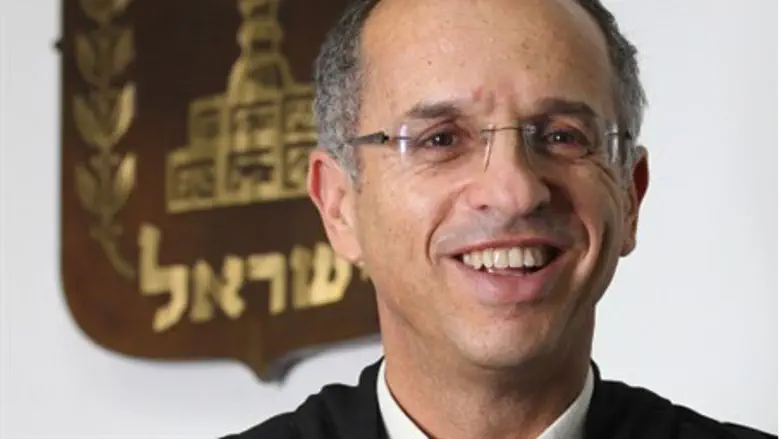
The Committee for Appointment of Judges selected four new judges to the Supreme Court on Friday, among them the hotly debated Justice Noam Solberg.
In addition to Solberg, who is religious, lives in Gush Etzion and does not have a leftist orientation as do most of the other judges, three of Supreme Court President Dorit Beinisch’s candidates were chosen as well. They are Tel Aviv District Court Judge Uri Shoham, Professor Daphne Erez-Barak, and the Vice President of the Jerusalem District Court Zvi Zylbertal.
The announcement that new judges had been appointed surprised many, since the members of the committee had said on Thursday they did not believe a decision would be made, since no agreement had been reached between Justice Minister Yaakov Neeman and Beinisch.
Beinisch, who is due to retire in February, has been fighting with all her might to prevent the court from changing its ultra-leftist hue and has come out publicly against the appointment of Judge Solberg for this reason.
The committee had previously met in November but had been unable to reach an agreement. At that meeting, Beinisch reportedly said she has “no problem” with Solberg’s appointment but that in the present atmosphere it is impossible to select judges. The selection process has become too political and charged and decisions cannot be reached, she said.
Solberg’s appointment was welcomed by Knesset members on Friday, including MK Uri Ariel (National Union), a member of the judge selection committee who said, “Fortunately, four judges were elected unanimously. Contrary to the concerns of many, the committee functions well when headed by Minister Yaakov Neeman and today this was proven.”
Ariel added, “The committee will meet again before the end of February to select the Supreme Court President and I'm sure we will continue to do good work in the future.”
Coalition Chairman MK Zeev Elkin (Likud) also welcomed the appointment and said, “This is a victory for common sense. Judge Solberg is an excellent judge who people wanted to disqualify just because he is a kippah-wearing settler.”
Davidi Perl, the Chairman of the Alon Shvut Community Council, and a candidate for the upcoming elections for head of the Gush Etzion Regional Council, also welcomed the appointment of Justice Noam Solberg to the Supreme Court.
"Noam is a perfect symbol of a man of personal integrity, love of man, pleasantness and grace and we are confident that he will do his duty faithfully and honestly for the judiciary in particular and for society in general," Perl said, adding: "The fact that a resident of Judea and Samaria has been elected, for the first time, to serve in the Supreme Court proves how deeply rooted the settlement movement is in the heart of Israeli society and is a credit to the Israeli court system."
Earlier this week, the Knesset approved the second and third readings of the law which has been dubbed the “Grunis Law”. 57 Knesset Members voted for the law and 37 voted against it.
The bill amends the Courts Law by canceling the item that says a Supreme Court President may only be appointed if he has at least three years remaining before his retirement.
The bill was named after Judge Asher Grunis, who will now be allowed to be appointed as Supreme Court President and succeed Beinisch. Many leftists have publicly spoken out against the legislation, despite Grunis’ left-leaning views,because he does not support the “everything is judiciable” approach that was instituted by Beinisch’s predecessor, former Chief Justice Aharon Barak. Some have said the legislation is “unconstitutional”, even though Israel has no constitution.
Meanwhile, Prime Minister Binyamin Netanyahu backed off from presenting another law to the Knesset that would change the structure of the Judge Selection Committee.
The law, popularly called the “Bar Association Bill”, would have called for a reappointment of two members of the committee who are members of the Israel Bar Association and who are close associates of Beinisch.
This bill, too, was attacked by the left, which called it a “putsch” by the right to change the nature of the Supreme Court.
According to reports, Attorney General Yehuda Weinstein convinced Netanyahu to pull support for the bill, telling him that the Supreme Court would probably declare it contradicts basic laws.
Netanyahu has shelved the legislation until further notice, likely meaning he will allow the bill to die.
(Arutz Sheva’s North American Desk is keeping you updated until the start of Shabbat in New York. The time posted automatically on all Arutz Sheva articles, however, is Israeli time.)